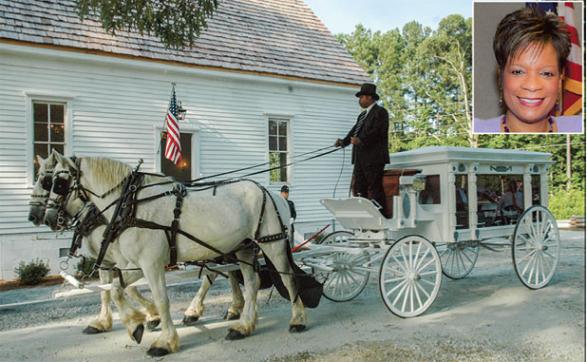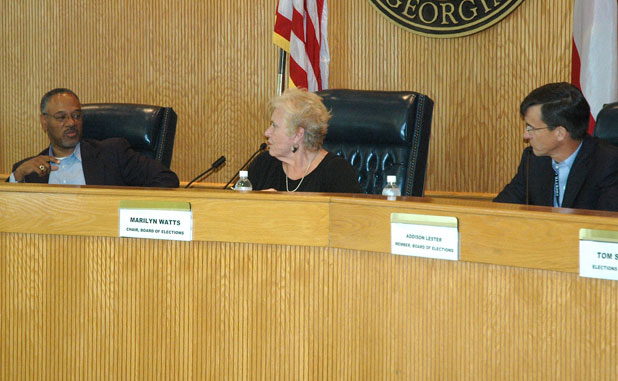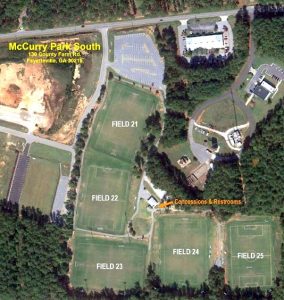UPDATED 7:55 p.m. Tuesday, July 14 — Here comes the special election, and a lot of people don’t like it.
The Fayette County Board of Elections voted the evening of July 14 to set Tuesday, Sept. 15, as the date that voters in all five voting districts will go to the polls and select the person to fill the Board of Commissioners seat left vacant by the July 3 death of District 5 representative Pota Coston.
The manner in which Coston’s successor will be chosen is also set — for now.
The election is to be decided by at-large voting and using the 2012 district map, and those two details were not included in the board’s motion, which passed 2-1 with Darryl Hicks voting against.
At right, above, the Fayette County Board of Elections discusses a point at the July 14 called meeting. (L-R) Darryl Hicks, Marilyn Watts and Addison Lester. Photo/Ben Nelms.
[See the opinion column “Honor the ‘process” in “due process”]
This was done before a standing-room-only crowd of more than 200 people in the Board of Commissioners’ meeting room at the county administrative complex in Fayetteville. More than 90 minutes of public comment took place before the vote, the majority of it by people who urged the board to maintain the district voting process and 2014 map used in Coston’s election last November.
But County Attorney Dennis Davenport advised the Board of Elections that those two issues were essentially out of their hands, as the 11th Circuit Court of Appeals’ ruling in January made the gerrymandered map and district voting process obsolete for now as a matter of law.
When Hicks asked what would happen should the board declare its intention to go with district voting and the new map, Davenport told him it would likely be ignored.
“You would be voting for something that does not exist,” he said. “The voting date is the crucial issue before you today, and that date is not solely at your discretion. You must use the date provided by state law, just as you must use the voting methodology provided by state law.”
Davenport laid out the legal reasoning for this election process as follows:
After the district voting lawsuit began in 2011, there were no hearings for evidence at the district court level. There were only motions from both sides for summary judgment, which Judge Timothy Batten was allowed to use as the basis for his ruling if he wished. He did just that, finding that there was a violation of Section 2 of the Voting Rights Act, and he implemented a remedy in the form of district voting and a new, racially selective map.
The 11th Circuit Court of Appeals made a decision that was procedural in nature, ruling that because Judge Batten made his ruling solely on legal arguments and not on facts in evidence, he could not find a violation of the Voting Rights Act because he saw no evidence such a violation occurred. That led to the appellate court’s ruling that the case go back to Judge Batten and start over.
Since no violations were found in a proper manner, the appellate court stated that the remedy cannot be implemented.
Davenport added that the appellate court made it clear that it could have overturned the 2014 election results but chose not to.
Hicks said just before the vote that he understood the law and what Davenport was saying, but he felt strongly that he had to take a different stand.
“I have to believe that we have an opportunity and defining moment right now to challenge the law and make the judge make a decision,” he said. “For me, this is more about what our children and grandchildren will experience than whether Darryl Hicks has to follow the law today. I believe that district voting moves us into the future.
“We’ve got to be strong enough to do the right thing because it’s the right thing.”
Fellow board member Addison Lester said that, while he likes having the ability to vote for all of his commissioners under an at-large system, he can support district voting because that’s the way our state legislators and members of Congress are elected. But he realized that from a legal standpoint that was not his decision to make.
Watts echoed that last comment, saying that she and the board “have pledged to follow the law. We are not attorneys.”
She quashed a rumor that had circulated throughout the county for a week, saying that her board was not directed by the Board of Commissioners in any way regarding their decision.
“We have not had any conversations about it,” she said. “They don’t have any more authority to change it than we do. If the method of voting needs to be changed, it is not up to us.”
Thirty speakers came to the podium, many of them repeating comments that have been heard at Board of Commissioners’ meetings the past six months and especially at last Thursday’s regular meeting. There were pleas to give minority voters a voice and charges that the issue was not about race but Democrats getting elected. Business leaders in the community expressed their fears of the possible economic impact of the ruling.
Batten’s order last year resulted in a district voting contest last November that saw Coston elected with two-thirds of the votes cast in the court-created District 5 in which black voters outnumbered white voters by about one percentage point.
Coston took office in January, just days before the federal appeals court overturned District Judge Batten’s summary judgment. Though the appeals court did not void the results of the district vote, the effect of their ruling was to return Fayette to its prior at-large voting status, pending a bench trial by Judge Batten. No date has been announced for that trial.
=====================================
UPDATED 7:30 p.m. Tuesday, July 14 — All the eligible voters in Fayette County will get to choose the next county commissioner from District 5 during special election Sept. 15, the Fayette County Board of Elections decided Tuesday evening.
And District 5 will be the 2012 version of the map, before any consideration of racial makeup was applied to the district lines.
=====================================
[EARLIER ONLINE VERSION]
It is unlikely that any Fayette County Board of Elections meeting in recent memory — perhaps ever — carried with it the air of anticipation as the one held this week.
[See “Honor the ‘process” in “due process”]
That three-member body was tasked with making the official call for a special election to fill the Board of Commissioners seat vacated by the July 3 death of Pota Coston. They were scheduled to convene in a special called meeting Tuesday in the commissioners’ main meeting room after this edition of The Citizen went to press. (See results of that meeting online at TheCitizen.com.)
Coston’s supporters packed that room last Thursday for the regular Board of Commissioners meeting, urging and even warning that board that the only appropriate course of action is to have this election just as the one which elected Coston, with voters only from her District 5 using the same map that led to her being the first black commissioner elected in the history of Fayette County.
Critics of the new voting system have said that it was created not to ensure blacks are put into office, but to ensure that Democrats can win in a heavily Republican county.
Since an appellate court reversed a federal judge’s ruling in the NAACP’s lawsuit that forced that district election and sent it back for trial, there has been rampant speculation about what will happen this time. The county is not commenting for the record until after the Board of Elections convenes and makes a decision, as by law it is their decision to make, not the commissioners’.
The Fayette Democratic Women released a statement Monday alleging that the commissioners have asked the election board to approve an at-large voting system to replace Coston.
Here is a portion of that statement:
“Until Coston’s election last November, no black candidate had ever been elected to either the County Commission or the Board of Education in Fayette County’s 194-year history. Black residents comprise 20 percent of the County’s population. In 2013 a federal court found that Fayette County’s at-large voting system violated the Voting Rights Act. A district map was drawn in 2014 to ensure better representation. Last November’s election was the first use of the district-voting system. It resulted in the victories of both Pota Coston and Leonard Presberg (Board of Education).
“The County Commission has asked the Elections Board to approve a September 15 special election using the at-large maps drawn in 2012.
“A 1967 local code that calls for at-large special elections under the at-large system went unchanged after the federal court order, and is at issue as the basis for approval today. The Commissioners and the Board of Elections have options. They may interpret the code as to hold a special election using the same rules as the regular election that preceded it. Alternatively, they may instruct their attorneys to offer, with the NAACP, an order for the judge to sign ordering the election proceed only in District 5. They could also choose to settle their appeal of district voting.
“At the Commission’s meeting last week, attended by a large crowd of community members, the Commissioners were asked to uphold fellow Commissioner Coston’s historic fight and legacy and to protect voting rights in Fayette County.”
The statement was emailed to The Citizen by Leonard Presberg, who heads the county’s Democratic Party leadership and is the last person to reach public office in Fayette due to a predecessor dying in office. He was appointed to the Board of Education and then won re-election under the new district voting system.
Presberg urged the four sitting commissioners to “attend the Board of Elections meeting [Tuesday] and let them know, that even though the County Commission cowardly left the decision to them, they still can do the right thing and replace our beloved commissioner using the same voting system that elected her.”
While the county has made no official comment since last week, Commissioner Steve Brown did not hesitate to respond to the allegations regarding his board and copied The Citizen on that correspondence.
“The county will use the form of voting allowed by Georgia law,” Brown wrote. “Just as the Board of Commissioners abided by the federal judge’s ruling, we must also honor the reversal of that ruling by the federal appeals court. There is no decision’ as we cannot make-up the law, but must, instead, accept the form of voting allowed to us by Georgia law. In judicial proceedings, it is the plaintiffs who must drop the lawsuit as the defendants do not have that capability.”
Presberg called Brown’s reasoning “a cop out” and said that the Board of Commissioners does indeed have options for putting an end to the litigation, some of which were outlined in Oparah’s press release.
“And plaintiffs don’t drop lawsuits, especially winning ones,” Presberg stated. “I know you don’t have as much legal experience as I do, but it’s defendants who settle. That’s how legal proceedings usually work.”
Brown replied, “If the plaintiffs are bound to win, then you really don’t have any problems, right?
“I believe your legal experience will tell you that a ruling that has been reversed is no longer valid. So, at this point, we move forward using use the form of voting allowed by Georgia law.”
In a separate comment to The Citizen, Brown said, “Please keep in mind that Mr. Presberg’s ‘settlement’ was also reversed by the federal court judge. They led the judge astray and he axed the ‘settlement.’”
Below, a horse-drawn caisson arrived at the Hopeful Primitive Baptist Church mid-morning on July 11 carrying the body of Fayette County Commissioner Pota Coston, who was buried later that morning in the church cemetery. The graveside service was attended by hundreds of family, friends and supporters. Inset, Pota Coston. Photo/Ben Nelms.













Leave a Comment
You must be logged in to post a comment.